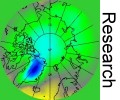 |
 |
An estimation of the future climate
In 2007 the next report of the state and future of our climate will be published by the Intergovernmental Panel on Climate Change (IPCC). Several institutes are carrying out larger model calculations about the future development of our climate under certain conditions. We show one example. [more ..] |
 | | Understanding climate models
Climate models use equations from physics, parameters and certain assumptions in order to generate an estimation of the future climate. We explain the basic frame necessary in order to develop such a model. [more ..]
|
 | | From the climate to a mathematical equation
Climate models are very complicated and abstract systems of equations. But we can demonstrate in a little model how we can describe a part of the climate system with the help of a simple equation. Here are understandable examples.
[more ..] |
 | | We work with a climate model
Here you can actively change values and parameters in a realstic Internet-based climate model. In this way you will get an idea of how such a model reacts if you change certain factors. [more ..]
|
 | | Links
Here you find a link lists with more information about how climate models work and how they are developed. [more ..]
|
 | | Information for teachers
Recommendations for the application of the magazine in the curricular context. [more ..]
|







